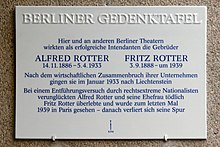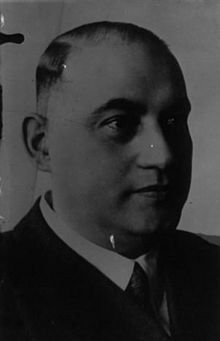Alfred Rotter

Alfred Rotter (born November 14, 1886 as Alfred Schaie in Leipzig ; † April 5, 1933 at Gaflei , Liechtenstein ) was a German theater operator of the so-called Rotter Theaters, director and producer.
The early successes
As a very busy stage manager and daring financial juggler, Rotter was probably one of the most colorful personalities in the Berlin theater business during the Weimar Republic . When Alfred Schaie born he had before the First World War Jura studied and with the financial help of his father and the promotion by the Lessingtheater -Director Otto Brahm asked by this time theater productions to his feet. Together with his younger brother Fritz Schaie , he acquired the basics of making theater at the Deutsches Schauspielhaus , in the establishment of which both fathers had once been financially involved.
In the middle of the war, the Schaie brothers, who had renamed themselves to Rotter at an early stage, acquired their first own venue, the Trianon Theater . Soon after, the next Berlin venue followed with the Residenz Theater . In July 1917, Alfred Rotter married Gertrud Leers, who was eight years his junior. Most recently, the brothers operated a total of nine houses, some as directors, but mostly as tenants. The Rotterdam stages included u. a. the Metropol-Theater , the Theater des Westens , the Lessingtheater , the Lustspielhaus and the Centraltheater , in which classics (plays by Euripides , Sophocles , Shakespeare , Lessing ) as well as plays by modern authors (including Ibsen , Hauptmann and Shaw ) were performed.
The Rotter brothers achieved their greatest commercial successes primarily at the Metropol Theater, the venue for the light muse. There they performed lively revues and operettas (e.g. Marietta, The Land of Smiles and The Song of Love , all between 1929 and 1931) as well as numerous tabloid pieces, some of which were staged themselves. One of the greatest successes of the Rotter brothers was the world premiere of Paul Abraham's operetta Ball in the Savoy in the Großes Schauspielhaus on December 23, 1932 with Gitta Alpár and Oskar Dénes , which the NSDAP forced to dismiss in connection with the boycott of Jews in early April 1933. Numerous Berlin theater and film greats were supported by the Rotters and earned extra income on their stages.
The collapse of the Rotter Group
In the late phase of the Weimar Republic, the nested Rotter Group - six GmbHs and two stock corporations - got more and more into serious financial difficulties (around four million RM bank and mortgage debts), as even the Rotter brothers lost their way in the course of the uncontrolled accumulation of arcades Threatened to lose track. Alfred and Fritz Rotter had often chosen constructions for their companies that freed them from any responsibility in the legal sense in the event of a crisis. Numerous financial claims from creditors went unheard - rent arrears, for example, which led the owner of the Metropol Theater, the Dorotheenstadt-Baugesellschaft, to file for bankruptcy against the Rotters on January 17, 1933.
In 41 lawsuits, the Association of German Stage Writers and Stage Composers alone tried to force the Rotters to finally pay their royalty debts. The creditors included such well-known composers as Paul Abraham (claim: 20,000 RM), Franz Lehár (12,000 RM) and Emmerich Kálmán (10,000 RM). To make matters worse, some late Rotter productions (around 1932) turned out to be disastrous box office flops. Less than two weeks before the National Socialists came to power , on January 18, 1933, the Vossische Zeitung reported a bankruptcy petition against the Rotter brothers. The Berliner Boersen-Zeitung said on the same day even from the ' collapse of Rotter stages' . Over 1300 employees of the collapsing corporate conglomerate lost their jobs from one day to the next.
Now de facto bankrupt, sat Alfred and Fritz Rotter, apparently following the Kurfürstendamm riot of 1931 had adopted in October 1931 for safety the citizenship of the Principality of Liechtenstein, on 9 or 22 January 1933, first in the Switzerland , then to Vaduz . Fritz Rotter in particular had desperately tried to find fresh capital to avert the complete collapse of the corporate empire. On January 22, 1933, the Mitte district court issued an arrest warrant for the brothers.
For the National Socialists who came to power immediately afterwards, the dazzling financial scandal came at just the right time: cursed as half-silly bankrupts, scourged as kings of the immoral Berlin nightlife of old style and reviled as poisoners of German morality, the Rotter brothers advanced to the Nazi propaganda hate image of " Jewish financial hazards ”: The Völkischer Beobachter called them contemptuously in its issue of January 20, 1933, the“ crazy theater Jews ”. In 1940 the likeness of Alfred and Fritz Rotters could still be seen as frightening examples of the supposedly characterless financial Jewry of the Weimar Republic in Fritz Hippler's filmic agitation 'documentary' Der Ewige Jude , the most notorious anti-Semitic work in film history.
Unsuccessful kidnapping attempt and death in Liechtenstein
In direct connection with the boycott of Jews that the NSDAP had carried out the week before in the German Reich, on April 5, 1933, some National Socialists from Germany and Liechtenstein lured the former theater operators out of their Liechtenstein exile refuge, an Alpine forest hotel , to meet Fritz and kidnap Alfred Rotter and his wife Gertrud to Germany. A chase through the mountains began. While Fritz Rotter was injured and escaped the captors, Alfred and Gertrud Rotter fell to their death while trying to escape from a rock below Gaflei. The remains of the couple were cremated four days later in Chur, Switzerland ; no burial site is known.
Whether the deaths were an accident, manslaughter or murder could never be clarified beyond doubt. The trial against the four Rotter persecutors from the Principality on June 7th and 8th, 1933 ended in Vaduz with extremely mild prison sentences, the miniature pogrom downplayed as the “Rotterdam affair” - it was the only politically motivated assassination attempt in Liechtenstein 20th century of importance - has been taboo for decades and has been successfully suppressed. Even this mild verdict was still offended by the population: shortly afterwards around 700 citizens of the country, which at the time had only a few thousand inhabitants, signed a petition demanding that the perpetrators be pardoned.
literature
- Kay Less : Between the stage and the barracks. Lexicon of persecuted theater, film and music artists from 1933 to 1945 . With a foreword by Paul Spiegel . Metropol, Berlin 2008, ISBN 978-3-938690-10-9 , p. 298.
- Peter Kamber: Fritz and Alfred Rotter. A life between theatrical splendor and death in exile . Henschel Verlag in EA Seemann Henschel, Leipzig 2020, ISBN 978-3-89487-812-2 .
- Peter Kamber: The collapse of Alfred and Fritz Rotter's theater company in January 1933. The reports of the Berlin bankruptcy and the anti-rot sentiment in the trial of their kidnappers . In: Yearbook of the historical association for the Principality of Liechtenstein, Volume 103, 2004 ( digitized version )
- Peter Kamber: On the collapse of the Rotter theater company and on the further fate of Fritz Rotter. New research results . In: Yearbook of the historical association for the Principality of Liechtenstein, Volume 106, 2007 ( digitized version )
- Peter Kamber: Short address on the inauguration of the memorial plaque for Fritz and Alfred Rotter . Berlin, Theater im Admiralspalast, July 4th, 2008 ( PDF )
- Rotter, Alfred , in: Frithjof Trapp , Bärbel Schrader, Dieter Wenk, Ingrid Maaß: Handbook of the German-Language Exile Theater 1933 - 1945. Volume 2. Biographical Lexicon of Theater Artists . Munich: Saur, 1999, ISBN 3-598-11375-7 , pp. 807f.
Web links
Individual evidence
- ^ Peter Kamber: Fritz and Alfred Rotter. A life between theatrical splendor and death in exile . Henschel Verlag in EA Seemann Henschel, Leipzig 2020, p. 33.
- ^ Peter Kamber: Fritz and Alfred Rotter . Henschel Verlag, Leipzig 2020, p. 18.
- ^ Peter Kamber: Fritz and Alfred Rotter . Henschel Verlag, Leipzig 2020, pp. 229–238, 259.
- ^ Peter Kamber: Fritz and Alfred Rotter . Henschel Verlag, Leipzig 2020, p. 193.
- ^ Peter Kamber: Fritz and Alfred Rotter . Henschel Verlag, Leipzig 2020, p. 347.
- ↑ According to the theater archive of Kay Less, he was then arrested in Swiss extradition custody for a long time and, immediately before the outbreak of World War II, was arrested again for bad checks in the casino in the French city of Boulogne.
- ^ Peter Kamber: Fritz and Alfred Rotter . Henschel Verlag, Leipzig 2020, pp. 390-420.
- ^ Peter Kamber: Fritz and Alfred Rotter . Henschel Verlag, Leipzig 2020, p. 420 f.
- ^ Peter Kamber: Fritz and Alfred Rotter . Henschel Verlag, Leipzig 2020, pp. 428–440.
| personal data | |
|---|---|
| SURNAME | Rotter, Alfred |
| ALTERNATIVE NAMES | Schaie, Alfred (maiden name) |
| BRIEF DESCRIPTION | German theater operator |
| DATE OF BIRTH | November 14, 1886 |
| PLACE OF BIRTH | Leipzig |
| DATE OF DEATH | April 5, 1933 |
| Place of death | near Gaflei, Liechtenstein |


